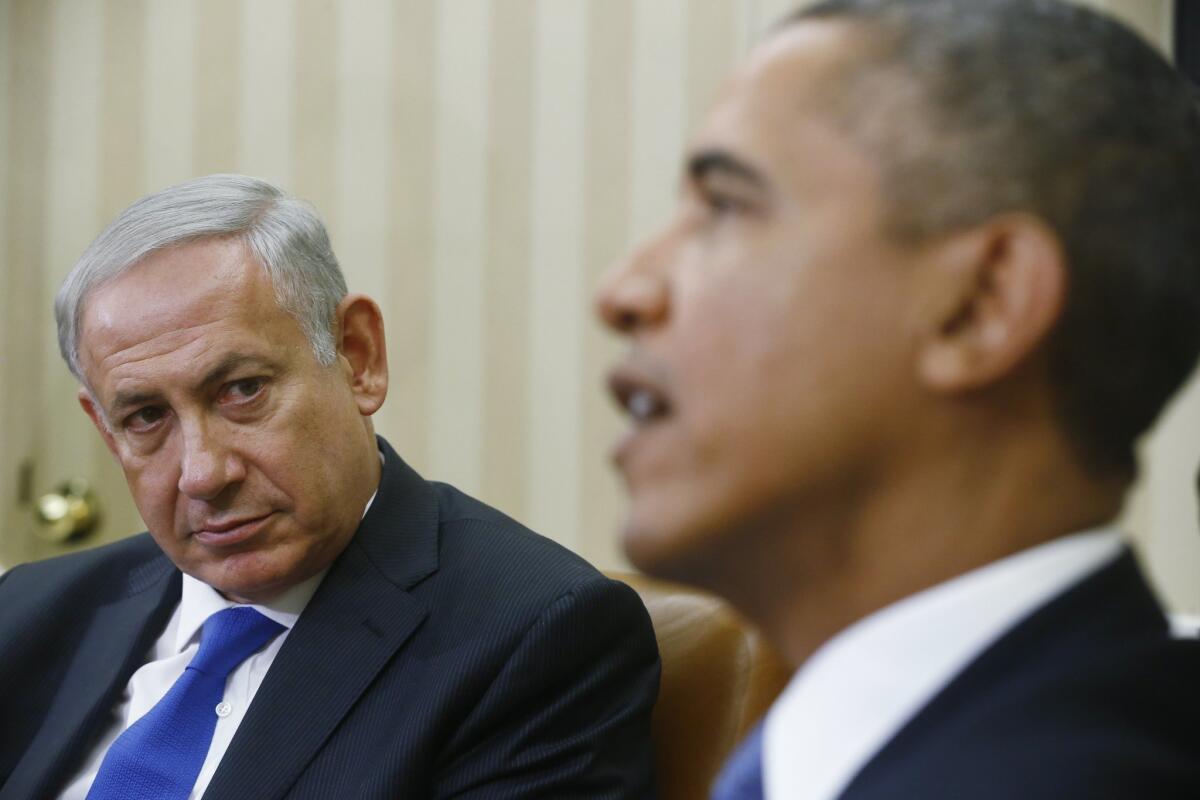Op-Ed: More ‘daylight’ between Netanyahu’s Israel and the U.S. -- is that what Obama wants?

From his first days in office, President Obama has been intent on creating some distance between the United States and Israel, because he viewed the closeness of the relationship as bad for American foreign policy. In 2009, during a meeting with Jewish leaders, he said: “Look at the past eight years. During those eight years, there was no space between us and Israel, and what did we get from that? When there is no daylight, Israel just sits on the sidelines, and that erodes our credibility with the Arab states.”
The implication was that Obama wanted a bit more “daylight” between the two countries. He proceeded to get it by pressing Israel for a settlement freeze, even in territories that everyone agrees Israel will continue to control, while not pressing the Palestinians for any comparable concessions.
Unfortunately the reelection of Israeli Prime Minister Benjamin Netanyahu on Tuesday, and the manner in which it was achieved, will only further Obama’s goal of weakening the links between the U.S. and Israel. Already, the two leaders have a venomous relationship. Obama, who is said to blame Bibi for supporting Mitt Romney during the 2012 U.S. presidential campaign, has reserved a kind of animus for the Israeli prime minister unlike any exhibited toward other world leaders, including Fidel Castro, Ayatollah Ali Khamenei and Vladimir Putin. In addition, an Obama administration official was quoted as calling Netanyahu a “coward” and referring to the prime minister by other barnyard insults.
This rancor is further reflected in the fact that it took two days for Obama to congratulate Netanyahu on his victory, something that the prime ministers of India, Canada and Britain, among others, had already done. The initial White House reaction was to send out a spokesman to blast Netanyahu in the kind of language normally reserved for authoritarian governments, not fellow democracies. Said Josh Earnest: “The United States and this administration is deeply concerned about rhetoric that seeks to marginalize Arab Israeli citizens. It undermines the values and democratic ideals that have been important to our democracy and an important part of what binds the United States and Israel together.”
What was it that provoked such ire? Did Bibi call for Israeli Jews to rise up and assault their Arab neighbors? Did he signal an intention to deny Israeli Arabs their constitutional rights (greater than those afforded Arab citizens by any Arab state save possibly Tunisia)? Nope. All he said was: “The right-wing government is in danger. Arab voters are coming out in droves to the polls. Left-wing organizations are busing them out. Get out to vote, bring your friends and family, vote Likud in order to close the gap between us and ‘Labor.’”
This is the standard sort of get-out-the-vote rhetoric that every politician engages in on the eve of an election. Given that the Joint List — a coalition of four Arab Israeli political parties — was sure to support the opposing Zionist Union, not his Likud government, Netanyahu’s call was understandable and hardly an incitement to ethnic hatred.
But even if Obama is the primary offender, Netanyahu is not entirely blameless in the dysfunction now gripping U.S.-Israel relations. Early on, Netanyahu tried to defuse tensions by, for example, agreeing to a 10-month freeze on building new settlements. But apparently Netanyahu has concluded that their differences are too wide to be bridged and thus has been willing to more openly challenge Obama — by, for example, lambasting Obama’s negotiations with Iran before a joint meeting of Congress.
Bibi further miscalculated — at least from the standpoint of Israel’s long-term interest rather than his short-term political gain — by vowing in the closing days of the campaign that no Palestinian state would be established during his watch. This was seen as a reversal of the commitment he made in 2009 and flies in the face of U.S. policy, not only under Obama but under George W. Bush as well.
Netanyahu easily could have said that while he remains committed to a two-state solution, the required Palestinian commitment to peace has not been forthcoming. Perhaps that is what he meant, as he suggested this week in postelection interviews. But under pressure to keep right-wing voters from defecting to smaller parties, he spoke in an emotive way that allows the Palestinians and the White House to (wrongly) paint Israel as the obstacle to peace, even though Israel had consistently shown its willingness to give up land (Sinai, Gaza) for peace.
With his incendiary rhetoric, Netanyahu played into the hands of those in the Obama administration who have exhibited animus toward him and his country. There are limits to how much damage even this White House can do to Israel, given the strength of pro-Israel sentiment here. But there are lots of unilateral actions the president could take — for example, refusing to veto future attempts by the Palestinians to win recognition for their state from the United Nations without first reaching a deal with Israel — that would do great harm to the Jewish state.
From the looks of things, the next two years could be the worst two years in the history of U.S.-Israel relations. And that could be just what Obama wants.
Max Boot is a contributing writer to Opinion and a senior fellow at the Council on Foreign Relations.
Follow the Opinion section on Twitter @latimesopinion and Facebook
More to Read
A cure for the common opinion
Get thought-provoking perspectives with our weekly newsletter.
You may occasionally receive promotional content from the Los Angeles Times.






